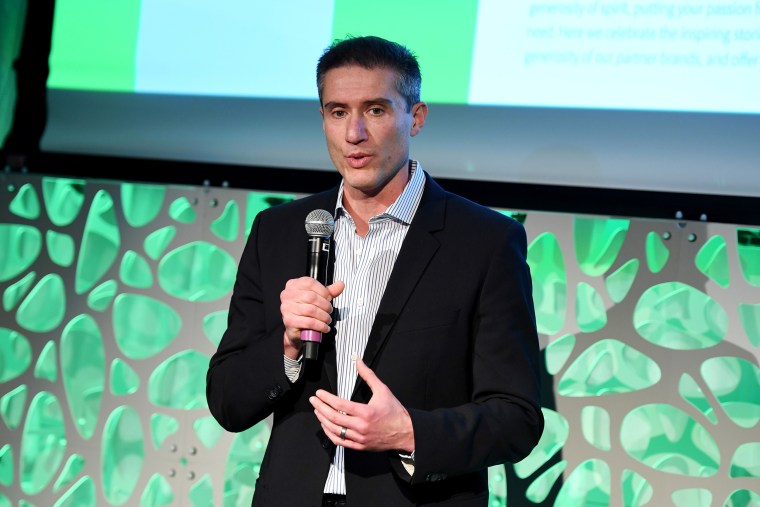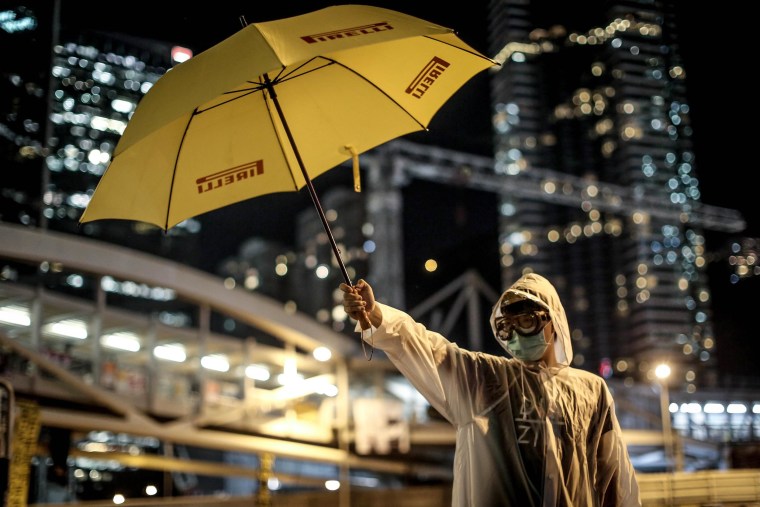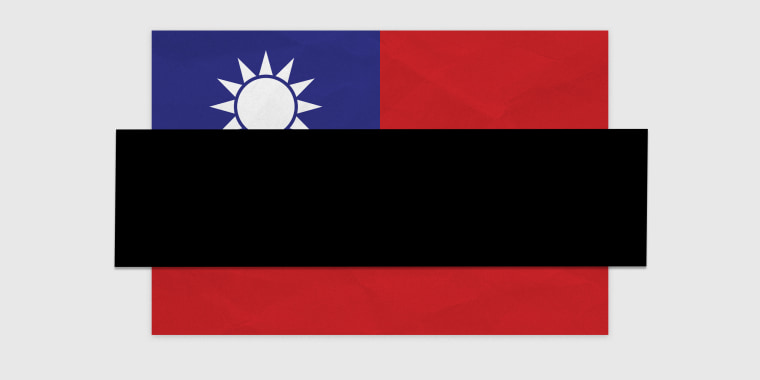Stan Pavlovsky, the No. 2 executive at the photo service Shutterstock, sounded frustrated. At what was supposed to be a celebration of a significant company milestone in December, employees instead focused on what had become an increasingly sensitive topic within the company: censorship and China.
Months earlier, at the request of the Chinese government, Shutterstock had begun censoring a few searches by users based in China for politically volatile subjects like "Taiwan flag."
Shutterstock employees who disagreed with the blacklist on free speech grounds kept asking about it at every big internal meeting. So, that day, Pavlovsky told them they were free to seek jobs elsewhere.
"The beauty of where we live and where we work is that we're free to make those choices," Pavlovsky told employees at the meeting at Shutterstock's offices, according to a recording of the meeting posted to a company internal website and heard by NBC News.
"And so, you know, it's a great market," he continued, "and employees have a lot of opportunities to work here, to work elsewhere, and we are very supportive when employees do not feel that this is the right place for them, to pursue other opportunities."
The reaction was shock for the more than 180 Shutterstock employees — about 20 percent of the company — who had signed a petition opposing the Chinese request even at the risk of the company's losing access to a potentially lucrative market, according to an employee who said they were at the meeting.
"Several people were like, 'Whoa, he just told us all to quit?'" said the employee, who spoke on condition of anonymity fearing possible retaliation.
It was a sign that a monthslong uproar at Shutterstock — a small, tightly knit company known for its cache of offbeat, extremely specific stock photos and video — wasn't fading away, reflecting broader conflicts swirling around tech companies, free speech and worker activism.
Shutterstock declined to comment on the internal recording specifically. In a statement to NBC News on Wednesday, however, Pavlovsky expressed similar sentiments. He said the company welcomes all voices and opinions from employees on a variety of topics and that it also respects employees who decide to leave the company after a fundamental disagreement.

"While a small group of employees expressed concern for this matter, many others have proactively communicated their appreciation for our handling of the topic and that they understood our decision," he said.
On average, Americans probably see Shutterstock's photos more than they realize. Founded in 2003 in the wake of the first internet bubble, the site provides an essential service to online journalists and advertisers by giving them a way to illustrate stories and advertisements. It recorded $651 million in sales last year, competing with the likes of Getty Images and Adobe Stock, and it paid a worldwide network of photographers for their work.
Similar scenes of worker unrest have played out in many U.S. tech companies as the dream of expansion to China and its growing market has run into the reality of employees who are increasingly wary of the tools they're being asked to build.
While the tension has played out publicly at major tech companies, including Google and Facebook, it's something that even Shutterstock, an under-the-radar company by tech standards, is having to face.
But companies have also grown more comfortable telling employees that they will have to learn to accept certain decisions. The heads of Microsoft and Amazon have pushed back on some employee efforts to abandon projects on ethical grounds, while Google has fired some employees who were workplace organizers, accusing them of misusing company resources.
"We really had very few brushes with these sorts of ethical problems in the past," said Stefan Hayden, a software engineer who left Shutterstock in December. He said he lost trust in its management over its decision to filter China searches and what he described as the secrecy around it. He worked there for nine years, more than half of Shutterstock's existence.
Download the NBC News app for breaking news
At least two more employees have left Shutterstock in protest of the company's not making more of a stand on human rights, Hayden and a current employee said, bringing the total number of departures to three. More employees are considering doing the same, two current employees said. The company has more than 1,000 employees, according to its most recent annual report.
"People feel management doesn't listen to them," a current employee said, expressing fear of retaliation for speaking publicly.
"By helping the Chinese government, we're an enabler, and that's something that really bothers me," the employee said, citing China's record on human rights, including its widely condemned treatment of ethnic Uighurs.
Shutterstock has endured an up-and-down existence since its stock began trading publicly in 2012. The company offers photographers a platform on which they can earn money by uploading photos, and in December it announced that it had paid out $1 billion to its contributors — a landmark it celebrated the day Pavlovsky spoke about people being free to leave.
But the company has faced challenges. Most recently, it reported a 63 percent decrease in net income for 2019 compared to the year before, to go with 4 percent revenue growth. The company said in its fourth-quarter earnings statement that rising marketing expenses, including in cybersecurity and data science, were the cause of the shortfall.
Pavlovsky, who was the chief operating officer, has been promoted since the December meeting. Shutterstock said this month that he'll be elevated to CEO in April, succeeding the company's founder, Jon Oringer, who was one of New York's first tech billionaires.
Heidi Garfield, Shutterstock's general counsel, said in an interview that the company doesn't want employees to leave over the China issue or any other similar disagreement.
"It's important to us that we have diverse views, and that diversity of thought is generally quite beneficial for the company," Garfield said. She said she disagrees with the idea that Shutterstock is pushing out employees who have a difference of opinion.
Oringer has defended the Chinese filtering in a memo to employees, arguing that the downside is outweighed by the benefit of providing up to 1.3 billion Chinese users with access to the vast majority of the company's material. Shutterstock says it has 310 million images on file. (The company has confirmed the authenticity of Oringer's memo.)
China has used its economic leverage to pressure even powerful American institutions like the NBA and Hollywood film studios to censor themselves, and Google has reportedly considered returning to the Chinese market with a censored search engine, sparking employee protests and resignations. Google said this week that it has no plans to launch the project and that no work is being done on it currently.
The Shutterstock situation provides a glimpse of how pressure from China can be subtle.
Shutterstock's road to China began around 2014, when the company struck a deal with the Chinese social network ZCool Network Technology to exclusively distribute Shutterstock images. It was a foothold in a potentially huge market, and Shutterstock invested $15 million in ZCool in 2018.
Last fall, employees at ZCool gave Shutterstock "feedback" that there was a Chinese government request to block politically sensitive searches, Garfield said. She said she never saw a demand in writing but considered it to be a lawful request.
Authorities in Beijing met with executives at ZCool's offices "a number of times" to discuss the issue, a Shutterstock spokesperson said.
The request was to create a blacklist of six banned terms, current and former Shutterstock employees said: "President Xi," "Chairman Mao," "Taiwan flag," "dictator," "yellow umbrella" and "Chinese flag," as well as variations of them. (Yellow umbrellas were a symbol of street protests in 2014.) Shutterstock confirmed the list.

Searches within China for those terms would produce zero results, even if Shutterstock might have thousands of relevant photos or videos.
But the request quickly ran into a problem: The small circle of software engineers who worked on Shutterstock's search tool hesitated, worried about setting a precedent for censorship.
For one of the engineers, the request was personal, three current and former employees said. One of the people who might be tasked to write the lines of computer code that would carry out the order, a Chinese national, asked not to work on the project, the three sources said.
"Even from the beginning, there was a kerfuffle about who exactly was going to do this work," Hayden said.
By mid-September, word spread within the company as more people were copied on emails about the project, leading upper management to make a statement to Shutterstock's engineering group, Hayden said. On the company's internal Slack messaging system, a new channel was created where employees questioned the management's reasoning, he said.
But executives' answers only seemed to inflame concerns, as days later employees began drafting a petition opposing censorship, Hayden said in an account that other former and current employees confirmed.
The internal petition is an increasingly common way for workers at tech companies to get the attention of their managers. And Shutterstock employees said that to write it, they looked for inspiration to their counterparts at Google, who wrote a petition in fighting a censored search engine in China.
"By complying, we are enabling injustices, including the discrimination of the people of Hong Kong, the suppression of Chinese political dissent, and undermining the sovereignty of Taiwanese people," read the Shutterstock petition, first reported by The Intercept. "This first step of building search filters lays open the door to more types of discrimination in the future."
In early October, Shutterstock was scheduled to hold a quarterly meeting with employees where, as often happens at tech companies, senior executives respond to questions that might come their way.
With employees gathered in the company's New York City headquarters, the question of the China policy quickly came up, according to Hayden and two current employees. Executives stood by their decision and were noncommittal about what came next: Shutterstock wouldn't agree to all future censorship requests, and it would evaluate them on a case-by-case basis, weighing the costs and benefits in each case, the three people said.
To some employees, that was the problem: Shutterstock hadn't made the right decision the first time around, so how could it be trusted to do so in the future?
"Where was the line? If the Chinese government asked for the name and contact information for a contributor who was posting inflammatory things, would they give it to them?" one employee said later.
Hayden said he didn't hear any willingness on the part of the company to compromise, and he decided that was too large a breach for him to repair.
"One of the answers we got was that our CEO wants to move on from this topic," he said. "That's when I thought, 'OK, I'll physically move on from the company.'" He said he began searching for a job and found one about a month later.
"It's his company. He can do whatever he wants with it," Hayden said of Oringer, the outgoing CEO, who says he remains Shutterstock's largest shareholder. "But if he wants people to be happy to work there, there has to be some sort of compromise." Oringer didn't respond to an emailed request for comment.
The code was written eventually, and the blacklist was put in place. But more than two months after the petition began circulating, executives were still being pressed on the issue — to management's apparent frustration.
"The culture that we want to build is also one where when leadership makes a decision, we move on. We commit, and we move on," Pavlovsky said at the Dec. 10 internal meeting.
Pavlovsky didn't respond to an emailed interview request, but in his statement Wednesday he echoed his earlier statement: "As a transparent organization, one of our core practices is that once we've had an open and honest conversation on a topic, then we commit and move on."
Chris MacAskill, a co-founder of the photo service SmugMug, said the entire tech sector is wrestling with the limits of the internet to expand freedom of expression, especially as once-small companies grow.
"The big social networks were all started for the most part by young programmers who had a little bit of a libertarian bent," MacAskill said. "The mantra was 'free speech' and 'we're going to liberate the world with free speech.' And as the companies have grown up, they've just had to face reality."

Getty Images, which competes with Shutterstock, also distributes material in China through a local partner company, VCG. A search of VCG for "Taiwan flag" produces zero results. Getty spokesman Matt McKibben declined to comment on whether it has received censorship demands from the Chinese government.
Adobe Stock, another competitor, is available in China, and a search on its site in China by NBC News also found zero results for "Taiwan flag." Adobe spokeswoman Anais Gragueb had no immediate comment on the company's censorship practices.
Current and former Shutterstock employees said a main point of frustration remains how little information the company is willing to share, such as how often it receives government orders. Larger tech companies, including Facebook and Google, regularly publish transparency reports laying out where and how often governments ask the company to take down or block content.
Garfield, Shutterstock's general counsel, said the company would consider publishing a similar report, but she said it might not have the staff to do so. "I certainly think that resources are an important consideration for us," she said.
The list of banned Chinese search terms hasn't grown beyond the original list of six, Garfield said, and she said any future request would go through the same internal process of determining, first, whether the request was lawful and, second, what its impact would be on Shutterstock's employees, investors, contributors and other affected parties.
"I don't think it sets a precedent," she said of the China policy. "From my perspective, compliance can take many forms in many different countries."
Shutterstock regularly receives takedown notices from more than 20 countries, not including requests related to intellectual property, the spokesperson said. The countries are primarily in Europe, Australia and North America, with some in South America, and the company addresses hundreds or sometimes thousands of requests a year.
In December, after months of internal debate over China, Shutterstock faced another international content question when Russia blocked its domains over a picture of a miniature Russian flag planted in a pile of feces. Shutterstock limits flag photos by its own worldwide terms and eventually removed the image, but not before expressing regret for not having acted "in a timely manner."
Pavlovsky has since begun holding "office hours" each week for employees who might wish to be heard one on one on any subject, one of the current employees said.
Another Shutterstock employee expressed doubt that the company would take many more steps toward transparency.
"Nothing I've seen up to this point has assured me we would be any less hasty and secretive in the future," the employee said.
